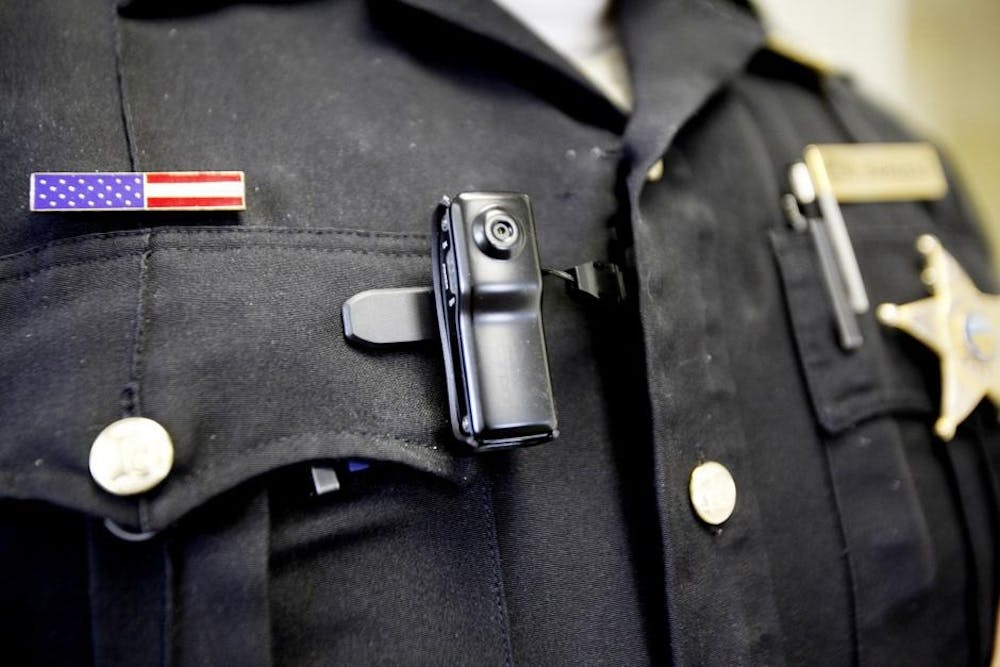Philadelphia Mayor Jim Kenney plans to ask city lawmakers for funding to provide 800 additional body cameras to city police officers.
The Philadelphia Police Department’s ultimate goal is to outfit all 8,500 officers with cameras by 2019. Body camera programs have also been initiated in other large cities including New York City, Chicago, Los Angeles and Houston.
Body camera programs are a way to improve evidence collection, to strengthen officer performance and accountability and to enhance agency transparency. The cameras can also be used to investigate and settle any complaints about officer-citizen incidents.
In the city’s 22nd District in North Philadelphia, about two dozen officers were involved in the original pilot program. Jennifer Wood, associate professor in the Criminal Justice Department at Temple University, who was a co-researcher for the pilot, said there were many positive outcomes including an increase in officer support towards wearing body cameras.
“We found overall that officers had very positive attitudes about the benefits of the cameras,” Wood said. “When officers became experienced with the cameras and got used to them, they became champions of the cameras. One of the things we learned is that one of the best ways to instill the virtues of body cameras while policing is to have officers who have worn them explain the benefits of the cameras to other officers.”
The new cameras are expected to be about $1.1 million. The mayor plans to fund his plan with a mix of both city and grant money. The money for cameras and a system to manage the footage is part of a $30 million proposal for investments in the police department.
The financial aspect is one of the largest obstacles to outfitting all police officers with body cameras. There is a high cost in buying new equipment, including a digital infrastructure to store all of the data.
Even with financial barriers, there is strong political support for police body cameras. In May 2015, President Barack Obama created a task force, which included the former Philadelphia Police Commissioner Charles Ramsey, to evaluate how “to strengthen community policing and trust among law enforcement officers and the communities they serve,” according to the president’s task force report.
Charles Loeffler, assistant professor of Criminology, said body cameras have gained a lot of political and public attention in the United States, so they have been quickly implemented. Researchers are now trying to find detailed evidence based on differing programs and areas.
“We are going through a period of very rapid adoption. The adoption is happening so quickly that we don’t have the evidence of success,” Loeffler said. “We would ideally like to know under what circumstance and for whom do the body cameras have desired or unintended consequences.”
In an interview with WHYY, Richard Ross, Philadelphia’s new police commissioner, said, “I am 100 percent behind body cameras.”
Ross’ department is extremely supportive of body cameras because he has said that they give a close real-life perspective of what an officer does and sees and can often change how people interact with officers.
Society has gone through many technological advancements that have shaped policing, such as the use of patrol cars, using computers in cars and wiretapping capabilities. Wood said that body cameras are the next technological development.
“You see technological advancements and political shifts towards improving the structure and legitimacy of police,” Wood said. “Thinking about those two broad shifts and how they intersect is a space where people are arguing that body-worn cameras can be used as a tool to advance transparency in policing, enhance community relations and enhance trust. “
In addition to body cameras, Loeffler said that there have been other ways to improve police relations, such as procedural justice. Procedural justice is founded on the perceived fairness of the process based on how they were treated, rather than the perceived fairness of the outcome. In other words, even someone who receives a traffic ticket or loses his case in court will rate the system favorably if he feels that the outcome is arrived at fairly.
“At the end of the day, there is a bunch of things police agencies can’t control. But what they do control is the training of their officers and the equipment that they are going to give their officers,“ Loeffler said.









